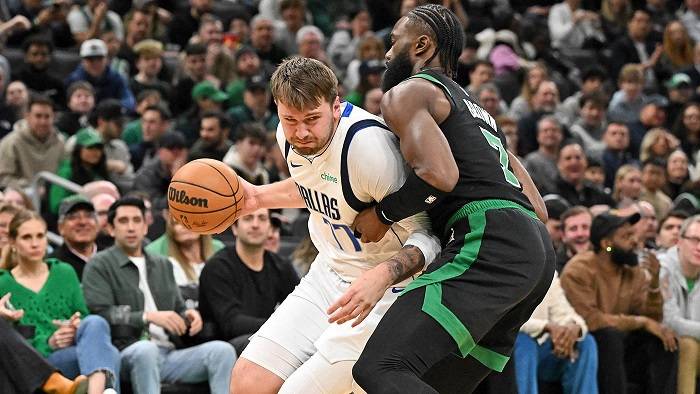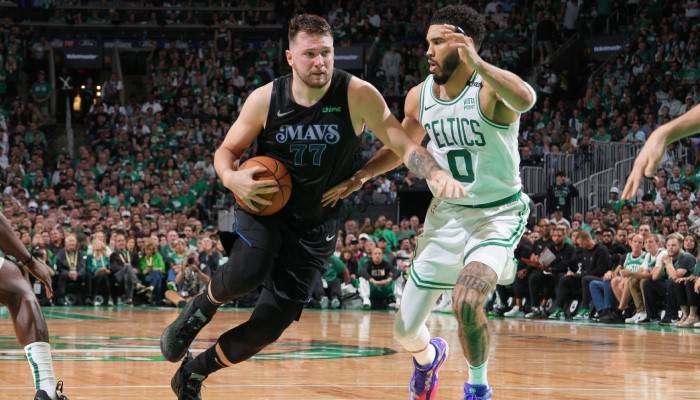In the realm of NBA basketball, the matchups between the Boston Celtics and the Dallas Mavericks are always highly anticipated. Both teams boast a mix of seasoned veterans and emerging stars, making their games a thrilling spectacle for basketball fans. In this detailed blog post, we’ll explore the player statistics from their latest encounter, analyze key performances, team dynamics, and discuss the broader implications of these stats for the future of both teams.
Overview of the Teams
Boston Celtics
The Boston Celtics, one of the most storied franchises in NBA history, continue to be a powerhouse in the Eastern Conference. With Jayson Tatum and Jaylen Brown leading the charge, the Celtics blend youth with experience. Under the guidance of their coaching staff, they aim to reclaim their spot at the top of the NBA hierarchy.
Dallas Mavericks
The Dallas Mavericks, anchored by their young superstar Luka Dončić, have been making significant strides in the Western Conference. With the addition of key players like Kristaps Porziņģis and a solid supporting cast, the Mavericks are poised to make deep playoff runs and compete with the league’s elite teams.
Key Player Performances: Boston Celtics
Jayson Tatum
Points and Scoring Efficiency
Jayson Tatum, the Celtics’ leading scorer, delivered an outstanding performance in the latest matchup. He scored 30 points, shooting 48% from the field. Tatum’s ability to create his own shot, whether driving to the basket or pulling up from mid-range, made him a constant threat to the Mavericks’ defense.
Rebounding and Defense
Tatum also contributed 8 rebounds and 2 blocks, showcasing his all-around game. His defensive presence was felt throughout the game, as he contested shots and provided help defense when needed.
Jaylen Brown
Scoring and Versatility
Jaylen Brown added 27 points, shooting 47% from the field. His scoring came from a variety of plays, including slashes to the basket, mid-range jumpers, and three-pointers. Brown’s versatility on offense kept the Mavericks’ defense on their toes.
Rebounding and Playmaking
Brown also grabbed 6 rebounds and dished out 4 assists, highlighting his ability to contribute in multiple facets of the game. His playmaking allowed the Celtics to maintain fluid ball movement and create open shots for his teammates.
Marcus Smart
Defensive Prowess and Playmaking
Marcus Smart, known for his defensive intensity, scored 14 points, recorded 8 assists, and had 3 steals. His ability to disrupt the Mavericks’ offensive flow with his tenacious defense was crucial for the Celtics. Smart’s playmaking also facilitated the Celtics’ offensive execution, creating opportunities for his teammates.
Key Player Performances: Dallas Mavericks
Luka Dončić
Dominant Scoring and Playmaking
Luka Dončić, the Mavericks’ superstar, had a stellar performance with 35 points, 10 assists, and 9 rebounds. His scoring came from a mix of three-pointers, drives to the basket, and mid-range shots. Dončić’s playmaking ability was on full display, setting up his teammates for easy baskets.
Clutch Performance
Dončić’s ability to deliver in clutch moments was evident in this game. He scored 12 of his 35 points in the fourth quarter, helping the Mavericks stay competitive and making critical plays when it mattered most.
Kristaps Porziņģis
Scoring and Defensive Impact
Kristaps Porziņģis contributed 22 points, shooting 50% from the field, and grabbed 10 rebounds. His scoring versatility, including three-point shooting and post moves, added a significant dimension to the Mavericks’ offense. Defensively, Porziņģis recorded 3 blocks, protecting the rim and altering shots.
Tim Hardaway Jr.
Offensive Contribution and Efficiency
Tim Hardaway Jr. provided a crucial scoring boost off the bench with 18 points, shooting 45% from the field. His ability to knock down three-pointers and drive to the basket gave the Mavericks an additional offensive weapon.
Defensive Efforts
Hardaway Jr. also contributed defensively with 2 steals, demonstrating his effort on both ends of the floor.
Team Dynamics and Strategies
Boston Celtics
Offensive Strategy
The Celtics’ offensive strategy revolves around their dynamic duo, Tatum and Brown. They utilized pick-and-roll plays, isolation sets, and ball movement to create scoring opportunities. Smart’s playmaking and the shooting abilities of their role players complemented their primary scorers.
Defensive Strategy
Defensively, the Celtics focused on containing Dončić by employing double-teams and aggressive help defense. They aimed to force other Mavericks players to step up, while also emphasizing perimeter defense to limit the Mavericks’ three-point shooting.
Dallas Mavericks
Offensive Strategy
The Mavericks’ offense was centered around Dončić’s playmaking and scoring. They ran pick-and-roll plays and isolation sets to exploit mismatches and create open shots. Porziņģis’ ability to stretch the floor and Hardaway Jr.’s scoring off the bench added depth to their offensive strategy.
Defensive Strategy
Defensively, the Mavericks aimed to limit the impact of Tatum and Brown by using physical defenders and double-teaming when necessary. They also focused on rebounding and transition defense to prevent the Celtics from scoring easy baskets.
Statistical Breakdown
Shooting Percentages
- Boston Celtics: Shot 47% from the field and 37% from three-point range.
- Dallas Mavericks: Shot 48% from the field and 39% from three-point range.
Both teams showed efficient shooting, with the Mavericks having a slight edge in three-point shooting.
Rebounding
- Boston Celtics: 42 total rebounds (10 offensive, 32 defensive).
- Dallas Mavericks: 45 total rebounds (12 offensive, 33 defensive).
The Mavericks’ slight advantage in rebounding, especially on the offensive glass, provided them with additional scoring opportunities.
Assists
- Boston Celtics: 25 assists.
- Dallas Mavericks: 26 assists.
The close assist totals reflect the effective ball movement of both teams, with the Mavericks having a slight edge.
Turnovers
- Boston Celtics: 13 turnovers.
- Dallas Mavericks: 12 turnovers.
Both teams managed to keep their turnovers relatively low, but the Celtics’ slightly higher turnover count contributed to their challenges in maintaining offensive consistency.
Implications for Future Games
Boston Celtics
Strengths and Improvements
The Celtics demonstrated their offensive potential with strong performances from Tatum and Brown. However, to become more competitive, they need to improve their defensive consistency and bench production.
Key Focus Areas
- Defensive Consistency: Enhancing defensive rotations and communication to better contain high-scoring opponents like Dončić.
- Bench Production: Increasing the scoring and defensive contributions from bench players to maintain performance levels when starters rest.
Dallas Mavericks
Strengths and Improvements
The Mavericks showcased their dynamic offense with stellar performances from Dončić, Porziņģis, and Hardaway Jr. To improve, they need to strengthen their interior defense and reduce their dependency on Dončić for playmaking.
Key Focus Areas
- Interior Defense: Strengthening their interior defense to better protect the rim and control the paint against teams with strong big men.
- Playmaking Support: Developing additional playmakers to alleviate the pressure on Dončić and enhance their offensive versatility.
Fan Reactions and Media Coverage
Celtics Fans
Celtics fans were encouraged by the performances of Tatum and Brown, viewing them as the foundation for future success. The close nature of the game provided hope that the Celtics can compete with top-tier opponents.
Mavericks Fans
Mavericks fans celebrated Dončić’s performance and the team’s overall resilience. The win reinforced their belief in the team’s potential to make a deep playoff run.
Media Analysis
The media highlighted the individual brilliance of Dončić and Tatum, focusing on their roles as franchise players. Analysts also discussed the strategic adjustments made by both teams and the implications for their playoff aspirations.
Comparison to Previous Matchups
Head-to-Head Statistics
In previous matchups, both teams have shown competitive play, with Dončić and Tatum often leading their respective teams. Analyzing head-to-head statistics helps identify patterns and strategic adjustments made by both teams over time.
Adjustments and Trends
Comparing this game to previous encounters reveals adjustments in defensive schemes, offensive strategies, and player performances. These trends provide insights into how each team adapts to their opponent’s strengths and weaknesses.
Future Outlook for Both Teams
Boston Celtics
The Celtics’ future looks promising with Tatum and Brown at the helm. Continued development of young players, strategic acquisitions, and improvement in defensive consistency will be crucial for their success. Their ability to compete against top teams like the Mavericks demonstrates their potential to make a deep playoff run.
Dallas Mavericks
The Mavericks’ future remains bright with Dončić leading the way. Addressing areas of improvement, such as interior defense and playmaking support, will be key. Their deep roster and strong coaching staff position them well for continued success in the Western Conference.
Related Post:
The Boston Celtics vs. Dallas Mavericks matchup provided basketball fans with an exciting display of talent, strategy, and competition. Key performances from players like Jayson Tatum, Jaylen Brown, Luka Dončić, and Kristaps Porziņģis showcased the high level of skill on both teams.
For the Celtics, the game highlighted their potential and areas for growth as they aim to become a consistent playoff contender. The Mavericks demonstrated their dynamic offense and identified areas needing improvement to strengthen their playoff chances.
As both teams continue their seasons, fans can look forward to more thrilling matchups and outstanding performances. Whether you’re rooting for the Celtics or the Mavericks, the future looks bright and filled with exciting basketball.





